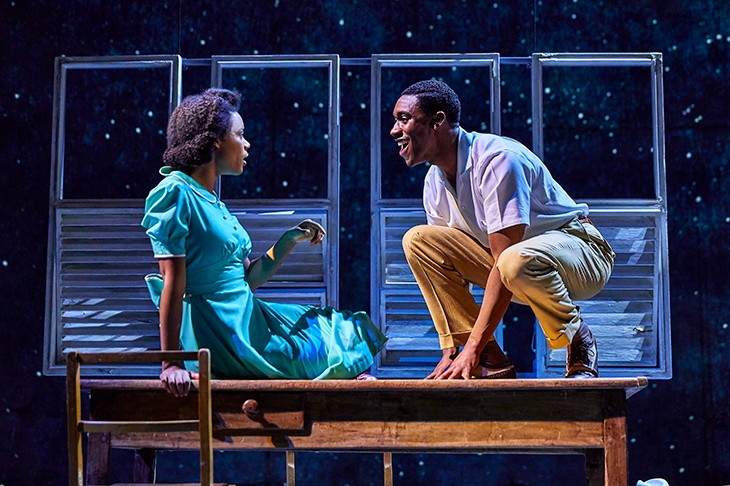Small Island, based on Andrea Levy’s novel about Jamaican migrants in Britain, feels like the world’s longest book review. We meet Hortense, a priggish school teacher, and her cool, handsome boyfriend who survive on a pittance in the Caribbean. Then we skip back to Hortense’s childhood in a house dominated by a bullying preacher who forbids conversations at mealtime. Then we cross the Atlantic to Lincolnshire and meet a chirpy blonde, Queenie, whose auntie runs a sweetie shop. Does Queenie want a job selling sweeties? Yes, says Queenie to her auntie. All this takes ages, and it feels like a deadly earnest sociology lecture.
Then a stiff young bank clerk enters the shop and asks Queenie if she’d like to go for a walk. And the show takes off. Their awkwardly platonic romance is hilarious, and although it’s exaggerated for comic effect it’s not untruthful. In the 1940s it was possible for partners to marry without having touched each other (‘You may kiss the bride’ — the first contact in some cases).
Another blessing arrives in the form of Gilbert, a charming, waggish Jamaican airman who believes that his RAF uniform will make him irresistible to women. The charismatic Gershwyn Eustache Jnr plays Gilbert’s sexual swagger with a hint of fun and self-mockery. Cary Grant did the same thing. In England, Gilbert’s dreams of studying law evaporate and he becomes a postman. But he’s not cowed. He retains his bullish optimism even when reduced to a poky bedsit with a gas meter under the sink that sucks the shillings from his pocket.
High-minded Hortense, now his bride, arrives from Jamaica and her grand entrance leads to another hilarious scene. Hortense assumes that the bedsit is a sort of ante-chamber to a much larger property. She asks to be taken on a tour of the premises. But it’s just a bedsit. And the bathroom is located in the basement several flights below. In a single second, Hortense’s dream of a princely future in England collapses. The show has lots of heart as well as a keen sense of hilarity and the story’s finale, concerning the fate of an unwanted mixed-race baby, is agonising and uplifting to watch.
This is a magnificent work of art, a moving and brilliantly detailed tapestry of England in the early post-war years. (But don’t worry if you miss the first half-hour.)
Ibsen’s Rosmersholm dramatises the conflict between revolution and authority. John Rosmer is an innocent Christ-like pastor born to a family of aristocrats and raised in a mansion where ‘children never cry and adults never laugh’. He embraces the democratic agenda of a new government but his forceful brother-in-law Kroll accuses him of betraying the ruling class. The play’s emotional pivot is Rebecca, a liberated woman who has been ‘comforting’ Rosmer since his wife committed suicide in the millstream. The Rebecca/Rosmer relationship will puzzle a modern audience because they appear to be lovers and yet the play insists that they aren’t. Rather than hopping into bed together, they stare intensely into each other’s eyes, noses half an inch apart, panting. The envious Kroll, meanwhile, is planning to destroy them using his influence with a local newspaper.
The show’s first half is enjoyable as an intellectual comedy of manners. Duncan Macmillan’s crisp, quirky adaptation smuggles modern buzzwords into an idiom that feels correctly antique and formal. There are lots of laughs. The characters discuss a firebrand orator who has vanished. ‘I’d heard he was in prison or a madhouse,’ Kroll suggests. ‘No,’ says Rosmer, ‘he became an actor.’ ‘Ah, I knew something terrible had happened.’ Another big laugh greets Kroll’s observation that voting is harmful to the electorate because it induces them to act against their own interests. A Remainer, obviously. He’s also a whisky-fiend who claims to occupy the chair of the local temperance society. Giles Terera captures his sonorous, self-regarding menace brilliantly.
The set by Rae Smith is a beauty. She creates a grand ballroom lined with oil paintings and varied by vast ravaged fireplaces. Floor-to-ceiling windows throw light on every detail of the room’s crumbling stonework and finishings. Elegant ruination is always watchable.
As Rosmer, Tom Burke gives a masterclass in charming affability. (Why can’t he replace that sulk-pot as Bond?) Hayley Atwell’s Rebecca has the intellectual brio of Katharine Hepburn with added sex appeal. And Peter Wight does a fantastic turn as the washed-up writer Brendel, who insists that he never accepts charity while drinking Rosmer’s claret, cadging banknotes from him and plotting to snaffle a new coat and boots. Ibsen’s craftsmanship deserts him in the second half. He leaves two promising characters, Brendel and Mortensgaard, unresolved and he opts for a hysterically morbid finale involving a crunching water wheel and a flash flood that inundates the stage. Even a Carry On film wouldn’t have included anything that silly.







Comments